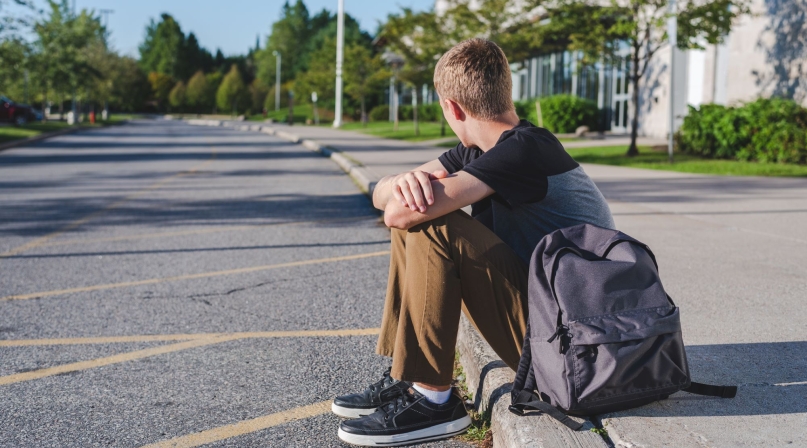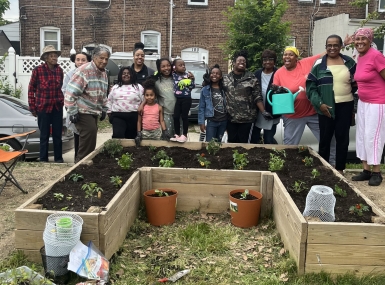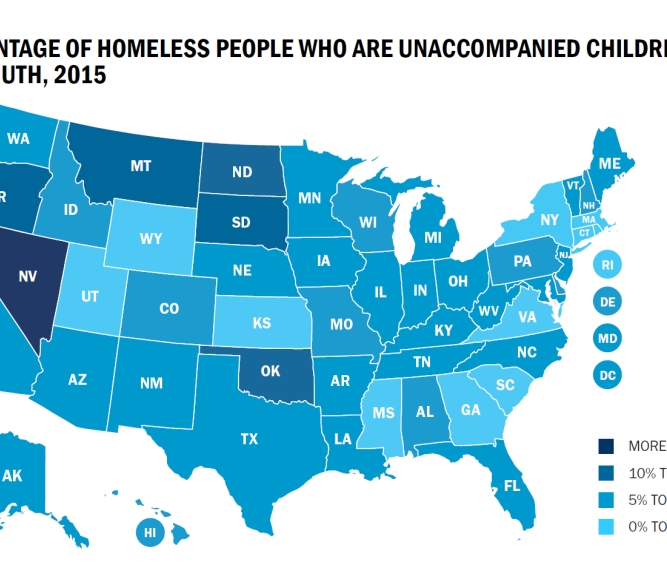New Jersey county offers transitional housing options for homeless youth

The second night that Devon Durant had to sleep in his car, with nowhere else to go, he thought to himself, “When will this end?”
For months, the then 20-year-old Durant was sleeping on people’s couches. He stayed with friends, family members, his girlfriend. There were nights when no one could offer a place to stay. On those nights, Durant would pull into a dark corner of the third floor of a parking garage or a dead-end street, lock the doors of his 2006 Honda Accord and try and fall asleep.
“I had trouble sleeping in my car,” Durant said. “It’s scary, because when you’re sleeping in a car — especially when you’re living out of your car — you can’t just park somewhere and go to sleep with all of your belongings. To have your ‘room’ be only separated by a [car] door onto the street, it was definitely an eye opener.”
The U.S. Department of Housing and Urban Development doesn’t explicitly address couch surfing in its four categories of homelessness — which include “literally homeless, imminent risk of homelessness, homeless under other federal statutes and fleeing/attempting to flee domestic violence” — meaning youth like Durant can fall through the cracks and not qualify for certain housing assistance.
Camden County, N.J. is making sure that doesn’t happen by investing in two transitional housing projects for youth ages 16-24, including those who couch surf. The first project, which is operated by the Transformative Justice Initiative, houses up to six young men at a time. A second project, for young women, is operated by the nonprofit Making it Work. It moved its first participant, a 16-year-old couch surfer whose parents have passed away, into housing on Oct. 1.
“What she said that really touched me [was], ‘I can’t wait to just get in a shower,’” said Marcie Walton, with Making it Work. “And I was like, ‘Wow, all the stuff we take for granted.’”
After moving in, the girl expressed shock at the home having paper towels.
“I said, ‘Those are the kind of things you won’t have to worry about,’” Walton said. “‘Because you can focus on something else besides daily survival now.’”
It’s key to address homelessness early on, said Robert Jakubowski, Camden County’s director of community development. “Couch surfing is going to lead to instability — not just at 18, not just at 21, but at 30 and at 50,” Jakubowski said. “So those populations who are homeless now in their 30s and 40s and 50s, probably were experiencing homelessness back when they were teenagers or early young adults.”
The youth transitional housing projects are part of Camden County’s broader plan to end homelessness and achieve “functional zero,” which is when the number of sheltered and unsheltered homeless people is no greater than the monthly housing rate, by 2030. The county commission established a Homeless Trust Fund, which devotes funding to initiatives tackling homelessness in Camden County, to help meet that goal.
Other initiatives funded through the trust include a multi-agency service center the county is building in partnership with the city of Camden that will act as a “one stop-shop for someone that finds themselves in this crisis,” and the creation of 211 new affordable housing units, according to Camden County Commissioner Virginia Betteridge.
“I believe that every person has their own story,” Betteridge said. “And we’re just trying to do our best to address the challenges that the Camden County constituents are facing, because sometimes it’s really, really hard. And I’m just glad that when funds become available and they come to us, that we can quickly get shovel-ready programs.”
Feedback from a conference the county hosted last year (which brought together stakeholders from the city and county of Camden) helped inform both the creation of new homelessness initiatives and the tailoring of existing programming, according to Betteridge. Having strong communication with the school system on what the needs are among youth is also an “integral part of being on the pulse” in housing insecurity, she added.
“Kids become couch surfers because they just don’t know what else to do,” Betteridge said. “And the day that someone doesn’t open their door is the day that it becomes a tragedy.”
A Camden County Point in Time report from 2022 found that youth (individuals and families with heads of households 24 years old or younger) made up 6.4% of the counted homeless population in the county. One youth who received a housing referral through the county had previously been staying on a friend’s couch when they were told: “You can’t stay here anymore,” according to Sharon Bean, Camden County Jail population manager.
“He found himself out on the street that night, with a serious medical condition,” Bean said. “So, this program helps to fill that gap for what exists right now in Camden County.”
Before shuffling from couch to couch and sleeping in his car, Durant lived with his father. The two had disagreements over finances and “lifestyle clashes,” according to Durant, which led to him getting kicked out.
Betteridge said that in her time engaging with Camden County’s homeless youth, she often finds a common thread of them feeling “unworthy,” because of their lack of housing or the situation that led to them being unhoused, which is why it’s important that the county assists not only with housing, but also wraparound services, such as mental health support, she added.
“Maybe mom and dad are out of the picture, maybe an aunt’s taking care of them, a grandmom, the cousin down the street, and they’ve struggled,” Betteridge said. “Because a lot of the situations, especially in the city of Camden, it’s a repetitive pattern. But you can’t give up on people. I always say to my kids, ‘When you traverse what is called ‘life,’ don’t ever look at a person from the outside, because you don’t know what they’ve been up against.’”
In June, the county’s Youth Services Commission opened the Restorative and Transformative Justice Hub, which serves youth between the ages of 10 and 26. The hub accepts referrals and linkages from the police department in lieu of station house adjustments, from probation in lieu of a probation violation and from the school district in lieu of suspension, according to Shakirah Jones, Camden County’s Youth Services Commission administrator.
“The overall goal is to establish what the core issue is,” Jones said. “And to help that young person and their family navigate through the services and supports that they need to be able to shift out of whatever that situation is and move more into stability and independence.”
The hub has made 15 linkages, Jones said. The services are only available to residents in the city of Camden, but the Youth Services Commission is working to expand it throughout the county, she said.
“Wouldn’t it be great to take someone who’s, at 18, couch surfing to fully employed and not only just stable, but owning his own home?” Jakubowski said. “This is the larger vision that we have, but it all starts from step one, of finding transitional housing.”
Durant has been living in the county’s transitional housing since August, which he got connected to after his girlfriend’s mom urged him to call NJ211, the state’s homeless hotline. Now having stable housing, Durant is a step closer to his dream of getting his degree and becoming a chemistry professor, he said. He’s currently saving up to go back to school, working a security job until midnight. In the meantime, Durant’s found a “camaraderie” among the other young men in the transitional housing, he said.
“We hang out, we play video games together and we talk about our goals in life,” Durant said. “We’ll sit down, ‘Hey, I want to do this,’ and ‘he wants to do that.’ ‘You know what? Hey, maybe we can do it together.’”
Related News

Maryland county invests in community ‘villages’
Baltimore County, Md. created a volunteer network or “village” to help with everything from groceries to doctor’s appointment to fighting isolation.

U.S. Congress passes reconciliation bill: What it means for counties
On July 3, the U.S. Congress passed sweeping budget reconciliation legislation.

U.S. Senate passes amended reconciliation bill text: What it means for counties
On July 1, the U.S. Senate narrowly passed their version of sweeping budget reconciliation legislation.
County News
Adult homeless strategies, poor fit for youths

